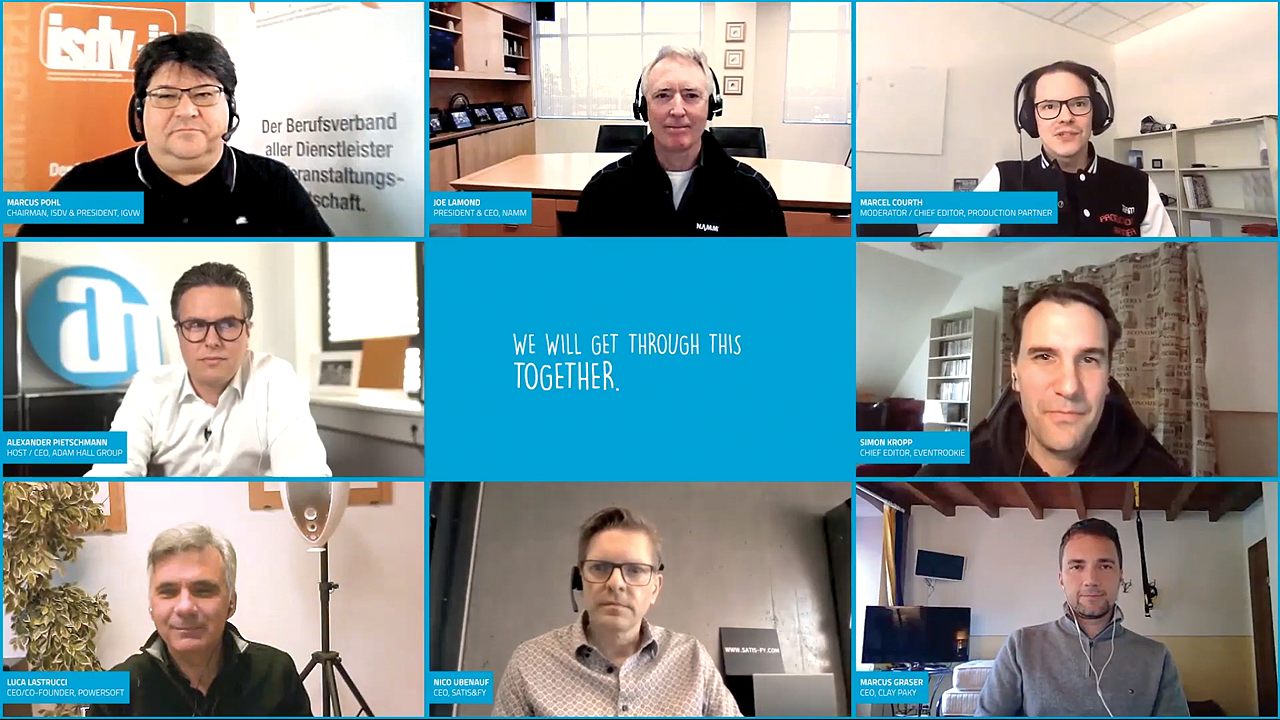NEW DATA THIS MONTH: Q1 2025 Import Tracker
TOP STORIES
 |
| A March 31 livestream featured commentary from NAMM’s Joe Lamond (top row, center), Adam Hall Group’s Alexander Pietschmann (middle row, left), and a cross-section of European industry professionals, along with the panel’s moderator, journalist Marcel Courth (top row, right). |
Web Panel Gauges Fallout
From COVID-19
Adam Hall Group hosts virtual gathering with European industry pros and NAMM’s Joe Lamond.
IT MIGHT HELP if we had something to compare this to, but voices from around the industry—and way beyond—agree COVID-19 is an entirely new kind of crisis. Following an avalanche of canceled music industry gatherings, including Frankfurt’s Musikmesse and Prolight + Sound fairs, Germany-based Adam Hall Group originally made plans for a digital product presentation, bringing highlights of its planned trade fair presence to a livestreamed web broadcast. As the scope of the pandemic came into focus, however, AHG changed course, devoting the March 31 livestream instead to a panel discussion on the state of the industry amidst a global crisis.
With much of the world’s population on some type of lockdown, seven industry professionals met digitally from their homes or deserted office spaces to talk through the implications of the pandemic and the sweeping “social distancing” strategies enacted to combat it. Along with AHG CEO Alexander Pietschmann, the panel included five other representatives from the European audio and live events world, plus NAMM President and CEO Joe Lamond, on hand to offer perspective from the U.S. side. Based on more than a century of ups and downs since NAMM’s founding in 1901, from the Great Depression to World War II, nothing offers any real comparison—”except for one thing,” Lamond said. “There is only one commonality that we have with those periods—and that’s that we got through it. And we came out on the other side stronger than ever.”
"Many of our colleagues have lost
friends, parents, in-laws….
That, of course, is the human tragedy—
and then comes the economic impact."
In a 90-minute discussion streamed on YouTube and Adam Hall’s own website, panelists described awakening in stages to a crisis that first seemed troubling; then suddenly disastrous; then almost beyond comprehension. Among the panelists, two represented companies based in Italy, the epicenter of the outbreak in Europe and home to one of the heaviest fatality rates worldwide. “It’s a very sad situation that a few weeks ago no one could have imagined,” said Marcus Graser, CEO of Lombardy-based lighting specialist Clay Paky. “Many of our colleagues have lost friends, parents, in-laws…. That, of course, is the human tragedy—and then comes the economic impact.”
At the Adam Hall Group, Pietschmann said, the descent from bad to worse began in late February, when he called Frankfurt Fair organizers to pull out of this year’s event—before adding that he didn’t see how the fair itself could go on. His prediction came true when it was canceled a few days later. Since then, AHG operations have transformed in ways that would be all too familiar to businesses worldwide. In-person meetings were replaced by video conferences, and intense sanitization protocols went into effect throughout company facilities. A “no-walkthrough” policy was enacted in warehouses for the benefit of logistics personnel still working onsite. The company also secured a source for protective masks, a scarce and much-needed commodity for medical teams worldwide, and purchased 300,000 of them, keeping 1,000 for AHG personnel and donating the rest to area hospitals. The company also closed down its on-campus restaurant—known, ironically, as “Come Together”—”which is the opposite of what we need to do right now,” said Pietschmann. As for the pandemic’s commercial impact, the inescapable upshot is that Adam Hall Group business is down 75%, Pietschmann reported. For the first time in its history, the company will be applying to an aid program offered by the German government. “It’s a hard step, emotionally, but we have to use it,” he said. “The safety of our people is, of course, the main issue.”
From across the Atlantic, Lamond also spoke on the role of government support for music industry businesses. When it comes to public funding, he said, NAMM traditionally deploys its lobbying powers on behalf of music education programs. Now, however, it’s music industry companies that are likely to need assistance—and it’s seemingly on the table in the form of the Paycheck Protection Program passed by Congress in late March. “Our role is to help our members navigate this system, to make sure money starts flowing,” said Lamond.
"No one had a playbook for this.
None of us asked to be here
at this time—but we are here.
And this is where our character
is being revealed."
With the panel weighted toward companies in the live events arena, unanswerable questions were posed as to what kind of marketplace will emerge from this crisis. Most predicted that, for better or worse, people everywhere will rethink their approach to concerts, festivals, trade shows, and even their careers. That’s not without its potential upside, some said, suggesting the pandemic could leave us with new innovations in telework, livestreamed events, and augmented reality as a complement to hands-on experience. “I think there will be a longing for live interaction when the world opens back up,” said Nico Ubenauf, CEO of Germany-based satis&fy AG, “but streaming and videoconferencing will also be part of the ‘new normal.’” As Pietschmann added, the images of clear canals and unpolluted skylines emerging from the sudden shutdown may inspire new standards for environmental responsibility. “The main asset we have in our industry is creativity,” he said. “We need to talk about how to make better use of it.”
For now, though, businesses are still taking stock of an epic, many-sided crisis. On the front end, retail sales and consumer demand have, in some cases, dried up overnight. On the back end, meanwhile, there are things teleconferencing can’t replace. “It’s hard to develop a product just by Skype,” one panelist said dryly. The overall effect is “surreal,” Lamond summed up. “No one had a playbook for this. None of us asked to be here at this time—but we are here. And this is where our character is being revealed.”

The leading SOURCE OF DATA & ANALYSIS SINCE 1890
© 2018 Music Trades Corporation. All Rights Reserved



 Contact Us
Contact Us

